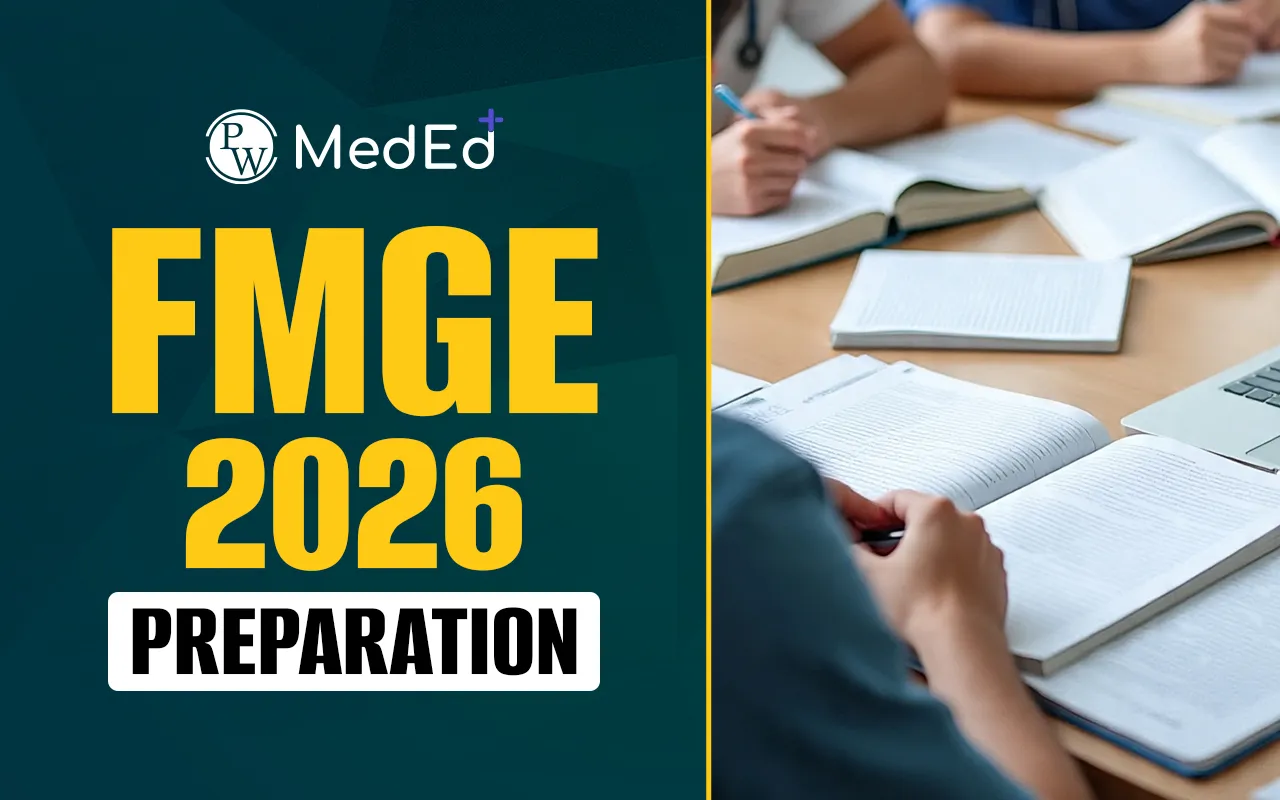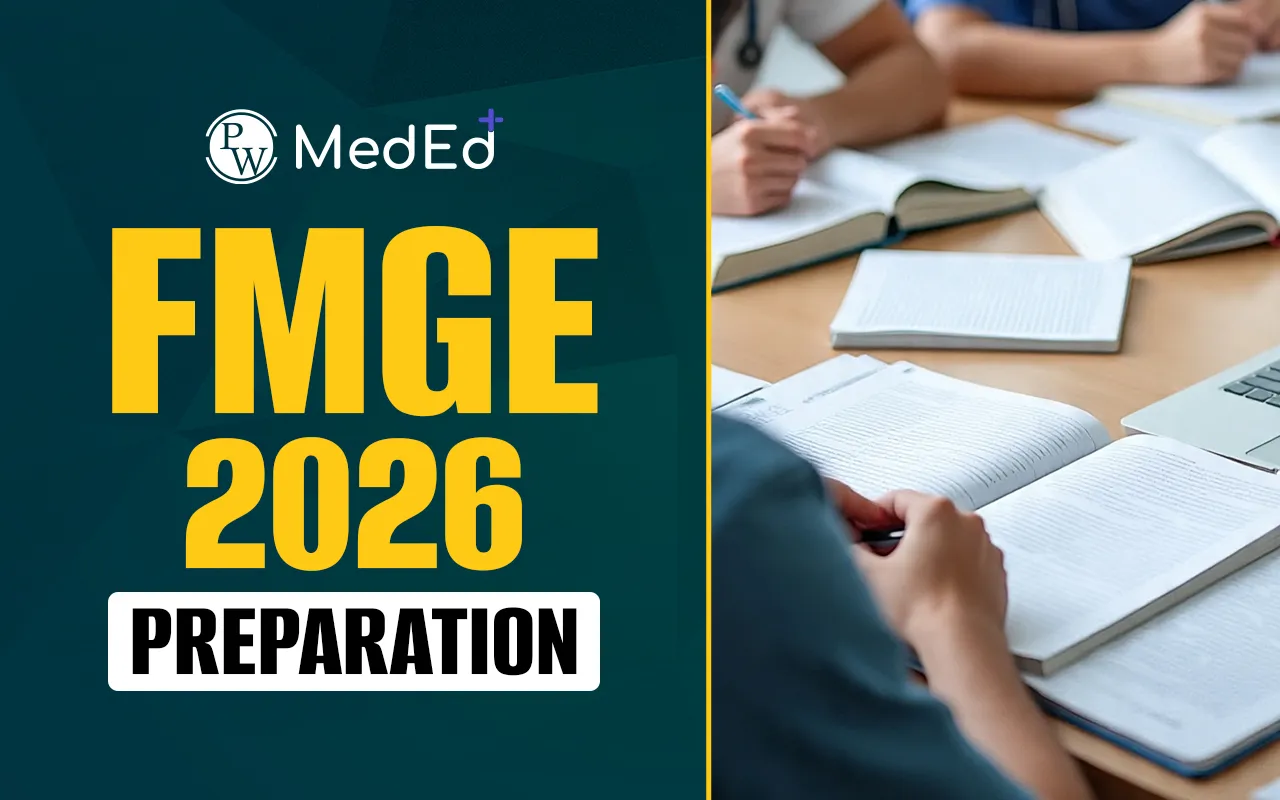

FMGE 2026 preparation requires a smart and focused approach. Candidates are informed of updated examination dates, need to understand the FMGE July 2025 Exam Pattern, and follow a subject-wise study plan for the best results. The exam serves as a gateway for foreign medical graduates who aim to practice in India.
FMGE 2026 will be a computer-based test consisting of 300 MCQs. There is no negative marking for the test, and candidates need to obtain a minimum of 150 marks to qualify. The test will be divided into two parts, each lasting 2.5 hours. The preparation must therefore be focused on high-yield subjects, regular MCQ practice, and consistent revision.
NEET PG Online Coaching - Enroll Now
FMGE 2026 Exam Overview
FMGE stands as the gateway to India for foreign medical graduates. The examination would test theoretical knowledge regarding 19 medical subjects, ranging from pre-clinical subjects to clinical subjects.
To understand FMGE 2026 preparation, the candidate needs to know an overview of the exam:
|
FMGE 2026 Exam Overview |
|
|
Detail |
Information |
|
Expected Exam Date |
June and December 2026 |
|
Application Start Date |
To Be Announced Soon |
|
Application End Date |
To Be Announced Soon |
|
Admit Card Release |
7 Days before the Exam |
|
Eligibility |
Foreign medical degree holders |
FMGE Exam Pattern
FMGE exam pattern 2026 will be the same as the FMGE July 2025 exam pattern. Computer-based, the exam will be divided into two papers, each containing 150 questions, and there is no negative marking for wrong answers.
The minimum qualifying marks are 50% in aggregate. The Exam will include all the major MBBS subjects; however, more emphasis will be given to clinical and para-clinical topics:
|
FMGE Exam Pattern |
|
|
Feature |
Details |
|
Exam Mode |
Computer-Based Test |
|
Structure |
Part A & Part B |
|
Total Questions |
300 MCQs |
|
Duration |
5 hours (2.5 hours each) |
|
Marking Scheme |
+1 for correct |
|
Negative Marking |
No negative marking |
|
Subjects Covered |
Pre-clinical, Para-clinical, Clinical |
FMGE 2026 Preparation Tips
FMGE 2026 preparation is done via a strategic 3-stage plan: studying the foundation, systematic revision, and readiness for the final exam. In each successive stage, focus, confidence, and accuracy build up to help students score successfully in the exam
Stage 1: Basic and Subject-Wise Study
Stage 1 lays the foundation for FMGE 2026. During this stage, you'll be reflecting on high-yield subjects, perceive the core concepts, and make notes in order to make revision easy later on.
-
Start with high-yield subjects such as Medicine, Surgery, PSM, OBG, and Pharmacology.
-
Move to other subjects such as Pathology, Microbiology, Anatomy, and Physiology.
-
Use trusted resources and make short notes for quick revision.
-
Conceptual learning, rather than a mere memorization of facts.
Stage 2: Comprehensive Revision and Mock Tests
Stage 2 helps you strengthen what you have already studied by revising regularly and testing yourself. In this stage, the focus will be on daily MCQs, weekly mock tests, and a check on your weak areas to improve your score.
-
Revise completed subjects systematically.
-
Practice MCQs daily: Try to do at least 100 MCQs every day.
-
Take full-length mock tests every week to simulate exam conditions.
-
Analyze test results and revisit weak topics.
Stage 3: Final Rapid Revision and Exam Readiness
Stage 3 is the final stretch where you rapidly review what you've learned. This phase would help you stay focused, avoid new topics, and use quick tools like notes and flashcards to keep yourself fully exam-ready.
-
Focus on short notes, flashcards, and formulas.
-
Avoid new topics; reinforce known concepts.
-
Take final mock tests and critically assess performance.
FMGE Subject-wise Strategy for Preparation
A Subject-wise Preparation Strategy for FMGE helps in organizing preparation based on weightage and importance. Prioritize clinical, para-clinical, and basic subjects for balanced conceptual understanding and effective revisions.
-
Medicine, Surgery, PSM, OBG, Pharmacology: These are high-weightage subjects. Study them first and revise frequently.
-
The key foundation areas would be: pathology, microbiology, anatomy, and physiology.
-
Clinical Subjects: Practice case-based questions and clinical scenarios.
-
Para-clinical Subjects: Focus on application-based questions and MCQs.
Time Schedule for FMGE 2026 Preparation
The main key to FMGE 2026 preparation lies in good time management. A well-planned daily schedule will help you study smarter and stay focused while covering all subjects on time. The following timetable will guide you as to what to study and when for better results with less stress:
|
Time Schedule for FMGE 2026 Preparation |
|
|
Time |
Activity |
|
6:30 AM - 8:30 AM |
Study high-weightage subjects |
|
8:30 AM - 9:00 AM |
Short break |
|
9:00 AM - 11:00 AM |
Practice MCQs and revise notes |
|
11:00 AM - 12:00 PM |
Take rest |
|
12:00 PM - 2:00 PM |
Study a new topic or concept |
|
2:00 PM - 3:00 PM |
Lunch |
|
3:00 PM - 5:00 PM |
Mock tests and error analysis |
|
5:00 PM - 6:00 PM |
Evening break |
|
6:00 PM - 8:00 PM |
Revision of weaker areas |
|
8:00 PM - 9:00 PM |
Dinner and unwind |
|
9:00 PM - 10:00 PM |
Review day’s learning and light reading |
|
10:00 PM |
Sleep |
FMGE 2026 Best Books to Refer
Choosing appropriate books is essential for efficient FMGE 2026 preparation. Given below is the list of standard, high-yield textbooks for each subject:
-
Medicine: Harrison’s Principles of Internal Medicine
-
Surgery: Bailey & Love’s Short Practice of Surgery
-
Pharmacology: KDT (Katzung & Trevor’s Pharmacology)
-
Pathology: Robbins and Cotran Pathologic Basis of Disease
-
Microbiology: Ananthanarayan and Paniker’s Textbook of Microbiology
-
Anatomy: Gray’s Anatomy
-
Physiology: Guyton and Hall Textbook of Medical Physiology
-
PSM: Park’s Textbook of Preventive and Social Medicine
-
OBG: Shaw’s Textbook of Gynecology
